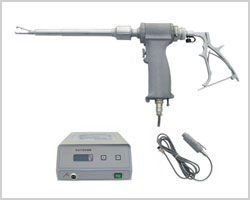Power Morcellators
 During many types of laparoscopic surgery, tissue is morcellated, or sliced up into smaller pieces so that it can be removed through a small incision. The tool that performs this operation is known as a power morcellator. Such tools have been used in laparoscopic surgery since 1993, primarily in operations to remove the uterus.
During many types of laparoscopic surgery, tissue is morcellated, or sliced up into smaller pieces so that it can be removed through a small incision. The tool that performs this operation is known as a power morcellator. Such tools have been used in laparoscopic surgery since 1993, primarily in operations to remove the uterus.
Medical professionals have long expressed concerns about the impact of morcellators on other organs, such as the bowels, pancreas, spleen, bladder and other vascular structures. In addition, because of concerns that power morcellators may spread certain cancers, the federal Food and Drug Administration (FDA) issued a warning in April 2014, recommending that doctors not use the tool in uterine procedures.
After the FDA issued another warning about power morcellators in 2014, the manufacturer of one of the devices, Johnson & Johnson, took its product off the market. According to FDA research, approximately one in every 350 patients who had a uterine laparoscopic procedure using a power morcellator developed some type of cancer.
If you or someone you love has contracted cancer after laparoscopic surgery using a power morcellator, GetLegal has the tools and resources to help you find skilled legal representation to protect your rights. Visit our attorney directory, look for your geographic location and find the best lawyer for your situation.
Connect with Top-rated Attorneys Near You
Sponsored Advertisement
Defective Drugs & Medical Devices Topics
Accutane
Aciphex
Actonel
Actos
Adderall and Ritalin
Advair
Aldara
Alendronate
Alli
Ambien
Amiodarone
Anzemet
Aptivus
Aranesp
Arava
Aredia
Aricept
Avandia
Avastin
Avelox
Avodart
Avonex
Azathioprine
Benicar
Clozaril
Concerta
Coreg
Crestor
Cylert
Cymbalta
Cytotec
Darvocet
Darvon
Daypro
Essure Birth Control Medication
Gadolinium
Granuflo
Hydroxycut
Invokana
IVC Filters
Ketek
Levaquin
Mirapex
Neurontin
Onglyza
OxyContin
OxyContin Birth Defects
Paxil
Power Morcellators
Pradaxa
Propecia
Reglan
Risperdal
Surgical Mesh
Tequin
Trasylol
Viagra
Xarelto
Xolair
Zelnorm
Zoloft
Exactech Hip and Knee Replacement Devices Subject to Recall
Latest Article
Lying Under Oath: The True Penalty for Perjury
What Is Perjury? What Must the Prosecutor Prove? What Are the Penalties? In the legal system, oral and written testimon... Read More
Protective Order vs. Restraining Order
What Is a Protective Order? What Is a Restraining Order? When Are They Commonly Used? You've been a victim of domestic ... Read More
Lawsuit Loans: Help or Hidden Financial Trap
What Is a Lawsuit Loan? How Do They Work? What Are the Risks Involved? If you've been hurt because of someone else's wr... Read More
GETLEGAL®ATTORNEY DIRECTORY
Find Leading Attorneys in Your Area
NEED PROFESSIONAL HELP?
Talk to an Attorney
How It Works
- Briefly tell us about your case
- Provide your contact information
- Choose attorneys to contact you





